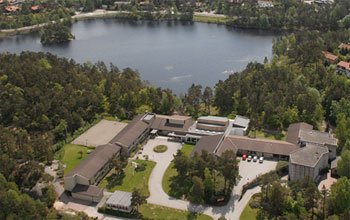Propaganda and Decentralization of Media
Missional Foundations for Engaging Media
Our everyday world is increasingly shaped by a wide spectrum of media technologies and media messages, wherever we live, work, and travel. We are constantly exposed to a plurality of messages, values, and worldviews through news, entertainment, and social media. This ever-changing media mosaic is a strong influence on how we experience meaning and fellowship, and on how we perceive truth and trust.
As followers of Christ, we need a holistic missional approach to these global media contexts and cultures. This is found in the media engagement paradigm1 which has three key facets:
Media awareness: We need competence in media literacy and media critique, to relate to media messages, media technologies, and media usages in a meaningful and relevant way and with Christian integrity. This includes engaging in key missional tasks such as personal formation, faith education, pre-evangelism, and evangelism.
Media presence: We need to be present as salt and light in the whole spectrum of mainstream media, affirming truth, human dignity, and meaningful relationships, and modeling professionalism, authenticity, and relevance. We also need to equip talented Christian communicators to live out, share, and defend biblical truth in such shared public arenas with conviction and grace.
Media ministries: We need to develop holistic media approaches for communicating the gospel through personal, church, and mission platforms and initiatives. This includes interacting with people around the biblical gospel, in authentic and relevant ways, both within and beyond the church. A key aim is to equip existing and new disciples to communicate biblical truth in convincing and compelling ways within their own spheres of society.
This holistic media engagement paradigm needs to be applied to two increasingly influential phenomena in today’s global media world:
Propaganda: Many media messages are being communicated with the primary intention of influencing people in terms of their thinking, acting, feeling, or believing. If such persuasive media messages are being shaped intentionally by leaving out essential information or by over-emphasizing other information, we are faced with propaganda. Cambridge Dictionary defines propaganda as ‘information, ideas, opinions, or images, often only giving one part of an argument, that are broadcast, published, or in some other way spread with the intent of influencing people’s opinions’.2 Even though many have become more sensitive to propaganda, it is often difficult to identify such propaganda-style communication.
Decentralisation of media: With the increasing availability of a variety of media platforms, more individuals and groups have created their own media channels. This has resulted in an increasing global decentralisation of media. Even though such democratisation of the media has its benefits, it often results in echo-chambers, exemplified by much communication through social media. Thus, most ideas do not travel very far, but remain within media silos.
Due to the pervasiveness of propaganda and echo-chambers, there is an urgent need for skillful media analysis and critique. We need to be able to discern our current media contexts locally and globally, and to engage and influence media meaningfully as we move forward towards 2050.
In this article we explore the role that followers of Jesus may play within the complex media spaces of propaganda and decentralised media. We build on the foundational premise of desiring to communicate factual, holistic, and meaningful truth that can be trusted. God is the truth. His written Word is fully reliable, and his truth is fully embodied in his Son Jesus Christ. These theological truths inspire us to communicate ‘trustable truths.
Due to the pervasiveness of propaganda and echo-chambers, there is an urgent need for skillful media analysis and critique.
’Communicating ‘trustable truth’ through the media goes much deeper than simply truthful information or accurate data. Propaganda may communicate partial and fragmented truths, whereas decentralised media may communicate anything by everyone without careful and insightful critique.
Contrary to all of this, the communication of ‘trustable truth’ embraces all of life in understandable, relatable, and integrated ways. Communication by God’s people is based on a care for all of life, being a blessing to all nations, and making disciples amongst all people groups through wholesome messages.3 Such biblical authenticity is what we want to encourage and nurture in local and global communities, with a view towards equipping for the future.

Challenges and Opportunities in Relation to Propaganda and Decentralised Media
Being media users and consumers, we are flooded with information and entertainment with a plurality of voices, values, and worldviews. As a global humanity living and working together in the world across deep differences, we need to reflect together on the impact of propaganda and decentralisation of media.
With such large amounts of media content easily available, most people do not have the time, capacity, or competence to check the validity of all the information they receive. People trust information most significantly when this originates from sources they have relationships with. Yet, even within such closer relationships, people do not have all the information correct. A high number of virtual connections may lead towards many superficial relationships. When we process information amidst media overload, we easily become overwhelmed and are not able to uncover propaganda messages. How should we respond to this missionally?
- In terms of media awareness, we need to develop a culture of media literacy among Christians and beyond, equipping and resourcing for constructive analysis and critique of potential propaganda messages.
- Whereas, in terms of media presence, we need to encourage Christians to become journalists, documentarians, and opinion leaders, who can affirm truth and human dignity with integrity in the shared public media spaces.
- Furthermore, in terms of media ministries, we need to be aware of the danger in church and missions of reducing biblical truths to propaganda-style communication, whether in terms of content, style, or attitude.
Whereas propaganda messages often tend to endorse the views of powerful leadership groups, decentralised media emphasise the views of many individuals and groups. The decentralisation of media relates to the increased plurality of media arenas and media messages across the world. Various cultural, ethnic, political, and ideological groups have their own media spaces, sustained, and supported by their own social media activities. How should we respond to this missionally?
- In terms of media awareness, we need to develop a balanced view of the decentralised media contexts where we both affirm the new media opportunities and reject the inherent tendencies towards fragmentation and isolation. We need a holistic view of the value of meaningful human fellowship across deep differences, deeply motivated by our Christian faith.
- Whereas, in terms of media presence, we need to foster and embody an attitude of trusted personal relationship across beliefs and worldviews. We need to model a deep respect for others, regardless of the personal worldview commitments. This includes a willingness to listen and to learn, as well as the mutual right to debate and critique, across existing echo-chambers.
- Furthermore, in terms of media ministries, the media communication shaped by Christian faith communities would take an alternative approach: influential leaders intentionally communicating holistic messages for the good of people, while individual messages by people would complement one another with wholesome truthful messages.
One of the key strengths of the Christian church is developing strong cohesive communities of Jesus-followers where many relationships can be nurtured simultaneously. Such communities can enable better processing of information, whether this information is received through local, national or global media channels and platforms.

A Case Study from the Middle East and North Africa
Evangelical practitioners of Christian media in the Middle East and North Africa, such as SAT-7, believe in media which proclaims, demonstrates, and encourages God’s grace and builds trust, as opposed to propaganda, which brings lies and half-truths, and then produces breakdown and mistrust. This begins by demonstrating that one is doing more than just engaging in mechanical transmissions of information or messages. So rather than merely presenting viewers with information, media is used to:
- Enable and foster genuine conversation, interaction, and engagement in real time
- Assist the church in facing oppositional claims or propaganda
- Provide a way for the church to publicly explain and demonstrate its message and its life.
Crucial to becoming trusted, in a growing climate of media mistrust, is showing in the content that one not only understands the good news of the gospel and its implications for life, but that one shares and understands the felt needs, questions, and lived experience of the actual audience as one seeks to bring a genuine relational encounter with Christ himself.
In a decentralised media environment, it means creating content with the people in society as much as for them, leaving the studios and meeting the audience where they live. It means equipping and providing locally based audience relations teams to engage with the individual viewers who contact the organisation in response to the broadcasts and other media content. It also means shaping the future media content to align with what one learns from the audience conversations and interactions. Furthermore, this may require the media organisation to equip and resource people in the communities of the local churches to also become capable of communicating effectively in a compelling way.
New digital media platforms and the decentralisation of media are providing better and more cost-effective opportunities to do this. This includes creating purpose-built video content and downloadable materials for these platforms. The future success and effectiveness of the traditional centralised linear broadcasts is increasingly being linked with the ability to engage audiences on digital media in spontaneous and interactive ways.
The digital streaming and video-on-demand services are now fully integrated with a global reach. However, while one now can physically reach anywhere those who speak the languages of the Middle East and North Africa, it is important to remain focused on meeting the unique and specific needs of the cultures and people living in the region. It would be a huge and unrealistic challenge to try to produce content that would effectively communicate the Christian message, in the way described above, simultaneously to a global audience.
Thus, the aim is to provide content that is distinctive in its beauty, sensitivity, and creativity, that is just right for a particular situation and audience, thereby demonstrating the qualitative concept of kairos4 with relevant messages at the right time to the various people.

A Case Study from sub-Saharan Africa
The region of sub-Saharan Africa is experiencing a renaissance of tribal worship that is largely championed by the propaganda that ‘Christianity is another person’s religion.’ How should African Christians respond to such propaganda emanating from those who counter the gospel? How do we honestly acknowledge the failures, limitations, and brokenness of prior kingdom workers, while undoing the misunderstandings of the gospel and missions amidst the recipients of the message?
Current followers of Jesus in Africa want to correct a wrong rendering of recent historical perspectives of global missions by themselves communicating an accurate portrayal of the relevance of the gospel within African contexts. Such messaging involved telling the current stories of how God is working uniquely through Africans in healing, restoring, and rejuvenating African communities through the gospel in the present days.
With the decentralisation of new media, the church is being called to learn the skills of providing factual, truthful, and timely responses to the many propaganda messages being distributed in society. How do individuals become courageous to embrace this important task?
Decentralised media now avails more platforms for locals to tell their own stories to a more global audience.
Unlike the recent modern era of 19th century missions, where the bearer of the news also had the advantage of taking literacy to the recipients of the gospel, the new era decentralises not only the messaging, but also the media. The bearer of the message no longer has neither an upper hand nor a monopoly. A decentralised media denies the messenger the power that previous communicators of the gospel relished. On the other hand, decentralisation could be a blessing in disguise, since it not only takes away the authority from the owner of the medium and distributes it, but it also gives power to the first-hand witnesses. Referrals by ‘authenticated users’ (or ‘witnesses’ of the gospel influence), are now considered more authoritative in the market than commercial adverts themselves. We are returning to trusting the witness! We now build relationships of trust with a ‘verified user’ faster than any other source of information.
How have the stories we have heard about missions changed over time? The perspectives that the global church has about missions in Africa may be based on very old data. That data was largely narrated from the perspective of the foreign gospel worker then and therefore risked representing their story as the entire story. Secondly, the Western missionary was a ‘trustworthy source’ because of the relationships they enjoyed with the church or publishers back home. Even when locals would tell a different story of the missional experience, the Global North church may not have believed them, since they would rather believe one of their own. Decentralised media now avails more platforms for locals to tell their own stories to a more global audience.
We want to encourage that ‘the missional story’ is communicated meaningfully. When people encounter and experience a missional lifestyle, they themselves can tell the stories of how they are seeing God working in society. And when they live within missional communities, they can together shape their messaging towards meaningful contributions about how God is shaping the lives of people around them.

Envisioning the Future in Relation to Propaganda and Decentralised Media
With the increased use of technology, such as artificial intelligence, we can anticipate that aspects of propaganda may be advanced even more through media algorithms and that decentralised media may continue to expand with even more people contributing their perspectives via media.
Various contexts of how information will be communicated can be envisioned for the future. On the one hand, increasing national controls in certain regions can limit communication of certain ideas, so that people will struggle to obtain balanced perspectives. On the other hand, strong pressures from communities to have everyone’s voice heard can also lead towards unbalanced information being shared, to the extent that even truthful information is no longer tolerated.
Quite alternative perspectives of futures can also be envisaged in which people openly listen to one another, respect each other’s perspectives, and are willing to engage with the truth they discern with one another. Amidst such open listening, the role of God’s Word is critical in shaping the perception of truth.
What approaches could help us along the road? Followers of Jesus do well in building a strong foundation by being grounded in the Word of God to shape all facets of life. This includes being nurtured within active faith communities, where holistic thinking may be developed for engaging critically and constructively with various media technologies and messages.
Such equipping begins with becoming informed and understanding core ideas that are being communicated, even when these come from biased perspectives. The primary motivation of love would be to engage with others through holistic messages and with a holistic lifestyle. If God’s people communicate biblical truth with clarity, integrity and sensitivity, people may be drawn to the gospel.
Concluding Reflections
As Jesus-followers in the 21st century, we live within cultural contexts where media messages often are unbalanced and biased, and many media platforms have become echo-chambers. In order to reach out missionally in such contexts, we need to be grounded in the biblical gospel and a holistic Christian worldview:
- We can be encouraged by John’s emphatic emphasis on Jesus himself as ‘the Way, the Truth, and the Life’ (John 14:6), who is ‘full of grace and truth’ (John 1:14).
- We can be inspired by Luke’s strong commitment to report truthfully about the origin and spread of the gospel, with a responsible relationship to his sources (Luke 1:1-4).
- We can be guided by Paul’s communication motto: ‘We have renounced secret and shameful ways; we do not use deception, nor do we distort the word of God. On the contrary, by setting forth the truth plainly we commend ourselves to everyone’s conscience in the sight of God.’ (2 Corinthians 4:2).
Such biblical principles constitute a basis for our media engagement, including how we relate to propaganda and decentralised media:
- As disciples and witnesses of Christ, we need to be equipped for media literacy and analysis, in order to understand and uncover propaganda messages, and to discern superficiality and biases within decentralised media (media awareness).
- We also want to encourage and equip talented Christian communicators to be salt and light in shared public media spaces, thus being counter-cultural in relation to propaganda and decentralised media (media presence).
- There is also a need to mobilise the whole people of God to share the gospel meaningfully and impactfully through personal, church, and mission media spaces, within and across both the major centralised media as well as the decentralised media (media ministries).
As followers of Jesus, we want our personal and collective lives to be in unison with our communication of the gospel, so that people who hear us may see our media messages being endorsed by our everyday lives. Thus, we need to pray that God may grant each one of us humility, courage, wisdom, and integrity to listen carefully to God and to voices in society, in order for us to competently and lovingly contribute media messages of meaning and hope.
Resources
- Ascott, Terence. Dare to Believe! Stories of Faith From the Middle East. Eugene: Resource Publications, 2021.
- Bilbro, Jeffrey. Reading the Times: A Literary and Theological Inquiry into the News. Downers Grove: IVP Academic, 2021.
- Cosper, Mike. The Stories We Tell: How TV and Movies Long for and Echo the Truth. Cultural Renewal. Wheaton: Crossway, 2014.
- Dahle, Lars. “Media engagement. A Global Missiological Task.” Lausanne Global Analysis 3, no. 1. (January 2014). https://lausanne.org/content/lga/2014-01/media-engagement-a-global-missiological-task.
- Crain, Natasha. Faithfully Different. Regaining Biblical Clarity in a Secular Culture. Eugene: Harvest House Publishers, 2022.
- Guinness, Os. The Global Public Square: Religious Freedom and the Making of a World Safe for Diversity. Downers Grove: InterVarsity Press, 2013.
- Jowett, Garth S. & Victoria O’Donnell. Propaganda & Persuasion. 7th Edition. Los Angeles: SAGE Publications, 2018.
- Kabutz, Rudolf & Lars Dahle. “Media Engagement Beyond the Coronavirus.” Global Missiology 18, no. 2 (April 2021). http://ojs.globalmissiology.org/index.php/english/article/view/2430/5766.
- Samples, Kenneth R. A World of Difference: Putting Christian Truth-Claims to the Worldview Test. Grand Rapids: Baker Books, 2007.
- Schultze, Quentin. Communicating with Grace and Virtue: Learning to Listen, Speak, Text, and Interact as a Christian. Grand Rapids: Baker Academic, 2020.
- Simmons, Annette. Whoever Tells the Best Story Wins: How to Use Your Own Stories to Communicate with Power and Impact. New York: Amacom, 2007.
- Strange, Daniel. Making Faith Magnetic: Five Hidden Themes Our Culture Can’t Stop Talking About… And How to Connect Them to Christ. Turkey: The Good Book Company, 2021.
- Taylor, Jenny J. “The Holy Responsibility of Journalism. Restoring Public Truth in a Media-Dominated World.” Lausanne Global Analysis 10, no. 2 (March 2021). https://lausanne.org/content/lga/2021-03/the-holy-responsibility-of-journalism.
- Taylor, Jenny J. A Good Story: How Journalism Really Began and Why It Matters Now. Lion Publishing, 2023.
- Watkins, Tony. “Contending for the Truth Amidst the Fake News Epidemic. Christian Witness in Today’s Post-Truth Society.” Lausanne Global Analysis 6, no. 4 (July 2017). https://lausanne.org/content/lga/2017-07/contending-truth-amidst-fake-news-epidemic.
Endnotes
- Lausanne Media Engagement Network. “Media Engagement as a Lausanne Theme.” Accessed August 2023. https://engagingmedia.info/media-engagement-as-a-lausanne-theme/.
- Cambridge Dictionary. “Propaganda.” Accessed August 2023. https://dictionary.cambridge.org/dictionary/english/propaganda.
- Lausanne Media Engagement Network. “Theological and Missiological Framework for Media Engagement.” Accessed August 2023. https://engagingmedia.info/theological-and-missiological-framework-for-media-engagement/.
- In the New Testament kairos means ‘the appointed time in the purpose of God’, the time when God acts (e.g., Mark 1.15, the kairos is fulfilled).






